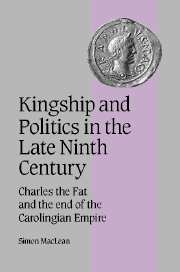 Kingship and Politics in the Late Ninth Century
Kingship and Politics in the Late Ninth Century Book contents
- Frontmatter
- Contents
- List of maps and figures
- Acknowledgements
- List of abbreviations
- Note on names, terminology and citations
- Outline chronology
- Figure 1 The Carolingian family
- Map 1 The late Carolingian empire
- 1 INTRODUCTION
- 2 UN-FRANKISH ACTIVITIES: CHARLES THE FAT IN THE EYES OF CONTEMPORARY ANNALISTS
- 3 THE MEN WHO WOULD BE KINGS: THE ‘SUPERMAGNATES’ AND THE ‘RISE OF THE ARISTOCRACY’
- 4 ROYAL POLITICS AND REGIONAL POWER IN THE LATE CAROLINGIAN EMPIRE
- 5 THE END OF THE EMPIRE I: POLITICS AND IDEOLOGY AT THE EAST FRANKISH COURT
- 6 THE END OF THE EMPIRE II: RESPONSE AND FAILURE
- 7 HISTORY, POLITICS AND THE END OF THE EMPIRE IN NOTKER'S DEEDS OF CHARLEMAGNE
- 8 CONCLUSION
- Bibliography
- Index
- Cambridge Studies in Medieval Life and Thought Fourth Series
8 - CONCLUSION
Published online by Cambridge University Press: 15 July 2009
- Frontmatter
- Contents
- List of maps and figures
- Acknowledgements
- List of abbreviations
- Note on names, terminology and citations
- Outline chronology
- Figure 1 The Carolingian family
- Map 1 The late Carolingian empire
- 1 INTRODUCTION
- 2 UN-FRANKISH ACTIVITIES: CHARLES THE FAT IN THE EYES OF CONTEMPORARY ANNALISTS
- 3 THE MEN WHO WOULD BE KINGS: THE ‘SUPERMAGNATES’ AND THE ‘RISE OF THE ARISTOCRACY’
- 4 ROYAL POLITICS AND REGIONAL POWER IN THE LATE CAROLINGIAN EMPIRE
- 5 THE END OF THE EMPIRE I: POLITICS AND IDEOLOGY AT THE EAST FRANKISH COURT
- 6 THE END OF THE EMPIRE II: RESPONSE AND FAILURE
- 7 HISTORY, POLITICS AND THE END OF THE EMPIRE IN NOTKER'S DEEDS OF CHARLEMAGNE
- 8 CONCLUSION
- Bibliography
- Index
- Cambridge Studies in Medieval Life and Thought Fourth Series
Summary
The deposition and death of Charles the Fat marked the end of an era. Contemporaries recognised the event's significance. The fullest verdict was that of Regino of Prüm, writing in 908:
After Charles's death the kingdoms which had obeyed his authority, as if lacking a lawful heir, dissolved into separate parts and, without waiting for their natural lord, each chose a king from within its own innards. This was the origin of great wars; not that the Franks lacked princes who by nobility, courage and wisdom were capable of ruling kingdoms but rather because the equality of descent, authority, and power increased the discord among them: none so outshone the others that the rest deigned to submit to his rule.
The other major author to comment on the events of the year 888 was the Bavarian continuator of the Annals of Fulda, who famously stated that after Charles's death ‘many kinglets [reguli] sprang up in Europe, that is to say in the kingdom of [Arnulf's] uncle Charles’. The importance which these writers laid on the emperor's death was not, of course, objective political analysis. Both of them had axes to grind. Regino's account was coloured by his own experiences: he himself had become a casualty of a particularly murky power-struggle in 890s Lotharingia, during which he was forcibly removed from the abbacy of Prüm, and this informed his bemoaning of the lack of royal authority.
- Type
- Chapter
- Information
- Kingship and Politics in the Late Ninth CenturyCharles the Fat and the End of the Carolingian Empire, pp. 230 - 235Publisher: Cambridge University PressPrint publication year: 2003
